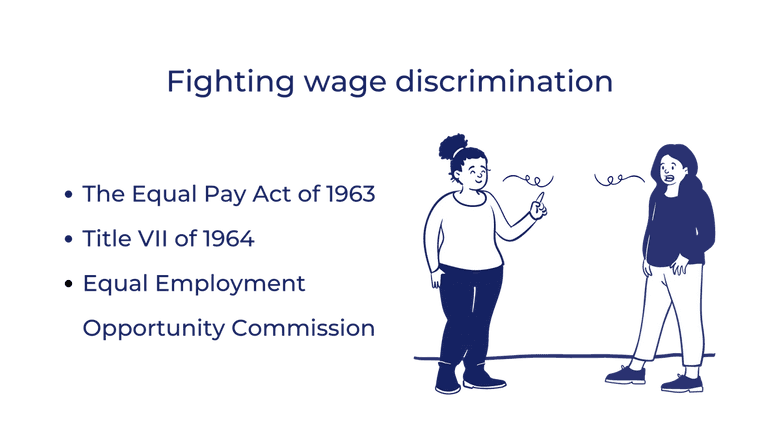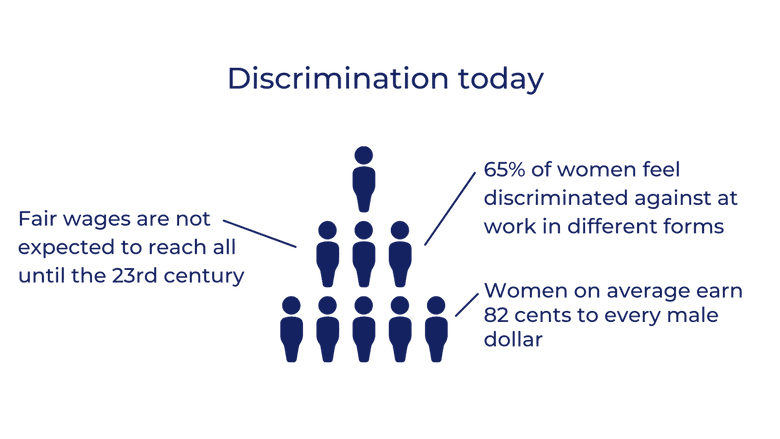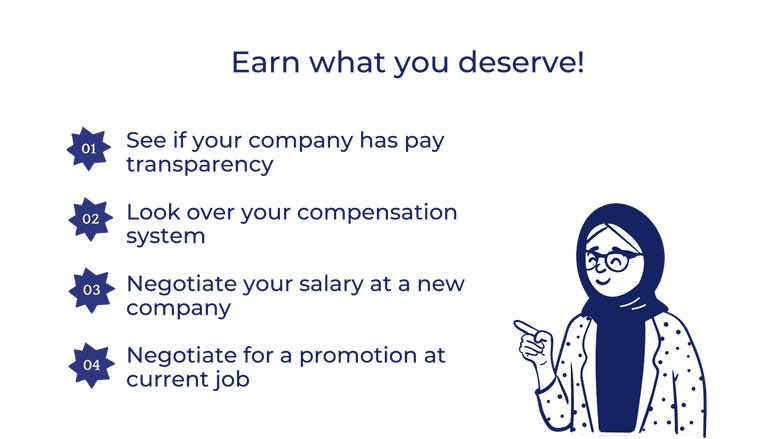What You Need to Know About Pay Equity
When it comes down to it, discrimination is discrimination, no matter how you slice it, and that can’t be justified by a job title or type of education.
When it comes down to it, discrimination is discrimination, no matter how you slice it, and that can’t be justified by a job title or type of education.
Many women face discrimination based on sex and race in the United States, resulting in the gender pay gap. This, in part, is due to white women and women of color working in fields that are often undervalued and underpaid, such as teaching and nursing. But even while working in a field like tech, women still face financial and non-financial discrimination. Sometimes it also is a result of different educational backgrounds and work experience. But at its core, discrimination is the problem.
Pay equity means that this discrimination is removed, and wages are equal regardless of sex and race; that equal pay comes from doing work of equal value. It’s alarming jumping into the workforce and experiencing first-hand that your work isn't valued as much as your coworker because of your identity. Not only is it intimidating, but it's disappointing. One of the beautiful aspects of getting your own job is the possibilities and control you obtain over where your life can go. But you realize that control is limited. Where do you go from here?
👉 Read next: Why is there a lack of female Asian leaders in tech?
The Legal Landscape of Equal Pay

Two Key Policies
Let's start off with the history of unequal wages in the United States. Or rather, the attempt to patch it up. The Equal Pay Act of 1963 and Title VII of the Civil Rights Act of 1964 are two laws that protect workers against wage discrimination.
- The Equal Pay Act makes it so that it's illegal for men and women to be unequally paid for equal or "substantially equal" work they have done. Meaning, men and women get equal pay for equal work. Simple, right? But this law remains limited for use between only men and women.
- Title VII, a more "inclusive" law, doesn't allow wage discrimination on the basis of race, color, sex, religion, or national origin. In 1981, the Supreme Court decided that Title VII prohibits this wage discrimination, even if the jobs are not exactly the same.
While federal pay equity laws have been attempting to fix this problem, states have recently acknowledged their stances on the issues, and how they can make a dent in the wage gap through their own laws. As a result, New York, California, and Massachusetts have taken initiative in emphasizing discriminatory pay practices in their state and local laws, as opposed to federal laws, which have remained stagnant.
The EEOC
A buzzword in today's pay equity policy discussions is EEOC (Equal Employment Opportunity Commission). Employers with 100 or more employees must give the EEOC information about said employees like race, ethnicity, and gender, organized by job category. But the big question is, should employers be required to give this pay data to the government? In response, the answer should be yes! If the EEOC has access to this information, they are able to aid equal pay laws and thoroughly look into pay discrimination.
So do these laws ensure that there is pay equity? Sadly, no. Although it's another step in the correct direction, this isn’t what pay equity looks like.
The Reality: Statistics to Blow Your Mind

According to the Institute for Women's Policy Research, in 2018, a full-time working woman earned 82 cents to the full dollar a man earned. That's an 18% difference. Throughout the decades, change has come, but incredibly slowly. Pay disparity is still a prevalent problem, especially for women of color. Nationally, Black women earn 62 cents and Hispanic women earn 54 cents for every dollar a man earns. Research shows that white women will achieve pay parity by 2059. But Black women will not reach equal pay until 2130 and Hispanic women will reach it by 2224.
Stereotypically, when thinking about tech companies, we think about how they’re a male-dominated workplace. According to research conducted by Hired, white women experience a 3% wage gap and Hispanic women experience a 9% wage gap difference than that of white men in the tech industry. In addition, 65% of women feel discriminated against in the workplace.
Discrimination goes beyond wages. It affects inclusivity in the workspace, promotions, mere treatment in the office, and so much more. But you can do something about this. Being in this position is uncomfortable and unjust, but that doesn’t mean you’re powerless. You have resources and you have your voice.
Self-Advocacy Through Negotiation

Advocating for a better salary can feel tricky. You don’t want to come off as awkward or ungrateful. But you know you’ve looked over your options and, when it comes down to it, you’re not being paid the value of work you’re putting in.
Check if Your Company Has Pay Transparency
This will allow you to see the employee wages from your company. You also want to go over your compensation system, which shows how your work is valued financially and non-financially. This includes, but isn’t limited to, commissions, overtime pay, and bonuses. A compensation system allows there to be a more clear-cut understanding of the work you're doing and how you’re being paid to do it.
Negotiate Your Salary
You also have the option of negotiating your salary, even if you're already on the job. Looking at your job responsibilities and whether you're eligible for a pay raise or promotion is warranted, especially if you suspect you're being paid less than others around you.
It’s okay to be nervous. Negotiating can be a daunting task. But remember that, as kind as you want to be, you need to be firm.
Be prepared with a number range when negotiating a salary, rather than a single number. Confidence and graciousness go hand in hand when negotiating. Show your appreciation, but stand your ground.
You are advocating for yourself because you know you’re worth it. You are worth the work you do. Help them understand why you deserve this number. Remind your employer that you’re more than the number you’re presenting. You’re an ambitious and determined worker, and you deserve to be paid what you're worth.
👉 Need help convincing your employer that you deserve a raise? Come prepared with this list.
The information provided herein is for general informational purposes only and is not intended to provide tax, legal, or investment advice and should not be construed as an offer to sell, a solicitation of an offer to buy, or a recommendation of any security by Candor, its employees and affiliates, or any third-party. Any expressions of opinion or assumptions are for illustrative purposes only and are subject to change without notice. Past performance is not a guarantee of future results and the opinions presented herein should not be viewed as an indicator of future performance. Investing in securities involves risk. Loss of principal is possible.
Third-party data has been obtained from sources we believe to be reliable; however, its accuracy, completeness, or reliability cannot be guaranteed. Candor does not receive compensation to promote or discuss any particular Company; however, Candor, its employees and affiliates, and/or its clients may hold positions in securities of the Companies discussed.
